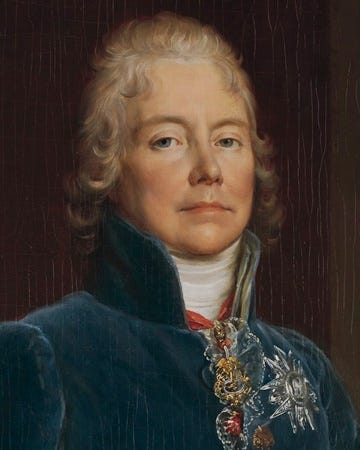Tragedies, crimes, mistakes
Refereeing the past
“It was worse than a crime, it was a mistake,” said the French diplomat Talleyrand about Napoleon’s decision to have a potential rival killed. The remark has been attributed to others, but it stuck to Talleyrand, who was known for his amoral approach to affairs of state.
The distinction meant little to the murder victim, the Duc d’Enghien. But for those with a taste for rendering verdicts on the past, the distinction can be useful.
“Crime” denotes the violation of some law. The law might be a statute of a government; in discussions of historical acts, it might be a moral law. Murder is judged a crime under both legal codes and moral codes.
Murder is more than mere killing. Some killings are permitted by law. Self-defense is allowed, and killing in war is not simply allowed but celebrated. Murder, moreover, requires intent. Accidental killings don’t rise to the level of murder.
Implicit in the concept of intent is an understanding that the perpetrator could plausibly have taken a different course of action. If a shooter’s hand was forced, either physically or psychologically, then a lesser charge than murder is brought.
While crimes require intent, mistakes emphasize outcome. The measure of outcome is not a legal or moral code, but the self-interest of the actor. The killing of the duke might or might not have been illegal or immoral, Talleyrand was saying, but it was stupid, for it was counterproductive to Napoleon’s self-interest.
Whether an action is a crime is knowable at once. It might not be known for some time; that’s what detectives and courts are for. But the criminality, if any, lies in the deed itself.
By contrast, mistakes are known to be mistakes only in the aftermath. The aftermath can take a long time unfolding. Was the human embrace of fire—of the ability to combine oxygen and carbon at will—a boon or a blunder? Fire has permitted humans to fill nearly every climatic and geographic niche on the planet, but now it threatens to cook many of those niches and many of us besides.
Tragedies, like mistakes, are known by their consequences. Tragedies can be the result of crimes or mistakes. Hitler’s decision to kill as many Jews as his armies could lay hands on was one of the greatest crimes in history, and it produced one of history’s greatest tragedies. The decision by government regulators to allow the use of thalidomide to treat morning sickness was a mistake; none of the regulators intended the horrific damage the drug did to fetuses. Their mistake resulted in tragedy nonetheless.
Other tragedies are not attributable to human action. No human was responsible for the San Francisco earthquake of 1906, or for the 2004 Indian Ocean tsunami that killed a quarter-million people. Such events are often called “acts of God,” as if to exonerate humans.
Most of the above is uncontroversial. Things get trickier when crimes and tragedies, in particular, overlap. The term genocide has been used to describe what happened to indigenous peoples in the Americas, Australia and some other long-isolated spots following the arrival of newcomers, especially colonizers from Europe. The indigenous population of what would become the United States collapsed by as much as eighty or ninety percent in the four centuries after the arrival of the Spanish, French and English.
All this death constituted a great tragedy. But genocide is a crime. Does that label apply here?
To be sure, many indigenous people were killed by the invaders in war and raids. But many, many more succumbed to diseases over which the Europeans had no control. The colonizers suffered from smallpox and the other diseases, too, albeit not as grievously as the Indians did. In a sense they were the vectors of the diseases; they carried the pathogens that caused the diseases. If the Europeans hadn’t come to the Americas, it might reasonably be said, the indigenous deaths wouldn’t have occurred.
But did that make the Europeans killers? Murderers? Perpetrators of genocide? It seems a stretch.
Indeed, to say that if the Europeans hadn’t come to America the Indians wouldn’t have died of disease is misleading. Sooner or later someone was going to come to America, if not from Europe then from Africa or Asia. Transportation technology had reached the point where trans-ocean travel was feasible, which meant that trans-ocean contact was inescapable. The effect on the indigenous Americans would have been the same.
As mentioned above, for an action to be a crime requires the availability of a plausible alternative to the action. In world historical terms, there was no plausible alternative to eventual contact between the inhabitants of Eurasia-Africa and the Americas, and such contact was bound to be devastating to the peoples of the latter. The result was a tragedy, but not a crime. And certainly not genocide.
So what?, might be the rejoinder. The dead millions were just as dead in either case.
Yet that’s the point. Casting blame brings no one back to life. And it obscures how history works. Yes, there are crimes. But there are also tragedies: terrible things that happen for which no one is to blame.
To pretend otherwise is not a crime, but it is a mistake.


During the Balkan wars of three or so decades ago, when Serbia's Milosevic was the "bad guy" of that era (Putin had to wait his turn), the _New Republic_ cautioned people not to go overboard with their rhetoric. As one of their writers put it, "Milosevic is not Hitler, and Sarajevo is not Auschwitz." In other words, war crimes (which ALL countries, including the good ol' red, white, and blue USA commit) do not equate to genocide.
🤷🏻♂️I remain skeptical of the innocence argument. IMHO, with the result we see as evidence, using the term “Genocide” rests upon the intent involved. Was the intent to usurp and wipe out a people? At some point in western expansion, the intent seems apparent.